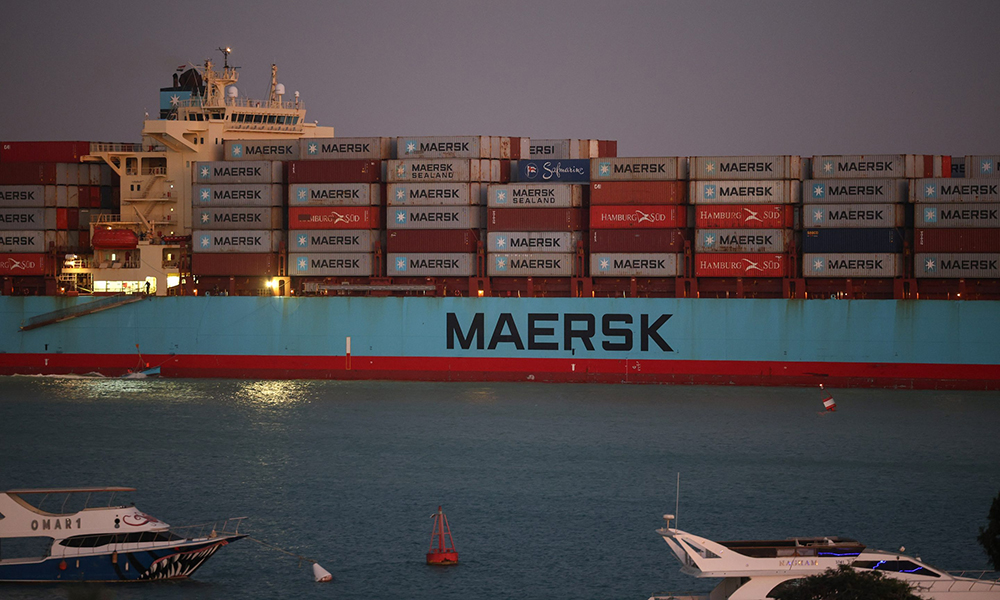
在上月也门胡塞武装袭击了一艘船只后,多家航运公司证实,它们将避开穿越红海的危险航线,这让股市松了一口气。
丹麦公司A. P. 穆勒-马士基集团(以下简称马士基)在去年12月底一艘船只遇袭后,暂停了其商船在该海域航行。近日,马士基发布通知,船只将改道南非好望角,“直至另行通知”,使得停航变成了无期限事件。
总部位于哥本哈根的马士基在一份声明中表示:“对该事件的调查正在进行中,我们将继续暂停所有通过该地区的货物运输,同时进一步评估不断变化的形势。”
此举提振了马士基的股价,该股上周二和周三分别上涨了6.4%和5.1%。上周四午盘,该公司股价上涨近3%。
自去年12月胡塞武装开始加大袭击力度以来(目前至少发动了23次袭击),其他数家公司也已采取措施,开辟替代航线,以避开红海和亚丁湾航线。
德国赫伯罗特(Hapag-Lloyd)表示,将至少在1月9日之前避开该航线,这使得全球两家领先的航运公司不得不寻找替代航线。
较早效仿的是地中海航运公司(MSC)和达飞海运集团(CMA CGM)等公司,它们在上个月袭击开始时就开始改变航线。
据美国全国广播公司财经频道(CNBC)报道,达飞海运集团(法国航运集团)表示,从1月15日起,该集团将不得不将亚洲至地中海地区的运费上调多达100%。
暂时停止红海贸易的公司合计占船舶市场份额的40%以上。
去年12月,地中海航运公司在一份声明中表示:“由于此次事件,为了保护我们海员的生命和安全,在红海航线安全之前,地中海航运公司船只将停航苏伊士运河的东行和西行航线。”
同月,英国石油公司(BP)成为首家暂停其油轮在红海通行的石油公司,这表明该地区日益需要加强海上安全。
改道带来的影响
穿越红海的贸易航线与苏伊士运河相连,而苏伊士运河处理着全球近三分之一的集装箱船货物,因此对欧洲和亚洲之间的货运至关重要。
就在各经济体在抑制通胀方面开始取得一些成果时,贸易的长期中断可能导致航运和配送成本上升。
马士基的一位发言人通过电子邮件告诉《财富》杂志:“如果不通过苏伊士运河而绕道好望角,航行时间会增加。这意味着燃料消耗增加,资产部署时间延长(船舶、集装箱、船员的日常成本)。额外的成本可以通过对受影响贸易航线的运输收取附加费来进行补偿,我们已经宣布了这一措施。”
尽管如此,分析师预计中断的规模不会像疫情期间那样大,当时供应链中断导致运费飙升。据美国全国广播公司财经频道报道,高盛(Goldman Sachs)预计马士基2024年的基本情况将是“勉强应付”,而不是加剧价格竞争。
是什么促使胡塞武装发动袭击?
作为对加沙冲突的回应,伊朗支持的也门胡塞武装分子开始袭击与以色列有关的船只。
此类袭击过去曾发生过数次,但自以色列-哈马斯战争爆发以来,其频率有所上升。
作为回应,美国及其盟国在12月中旬左右启动了“繁荣守护者行动”。
据美联社报道,从那时起,军舰开始在该地区巡逻,美军甚至向胡塞武装开火,杀死了许多胡塞武装分子。
美国国防部长劳埃德·奥斯汀(Lloyd Austin)在去年12月的一份新闻稿中表示,胡塞武装在海上的暴力行为“威胁到商业的自由流动,危及无辜的海员,违反了国际法”。
包括美国、英国和日本在内的一些国家周三也向胡塞武装发出警告,如果他们不停止袭击,就可能采取军事行动。(财富中文网)
译者:中慧言-王芳
在上月也门胡塞武装袭击了一艘船只后,多家航运公司证实,它们将避开穿越红海的危险航线,这让股市松了一口气。
丹麦公司A. P. 穆勒-马士基集团(以下简称马士基)在去年12月底一艘船只遇袭后,暂停了其商船在该海域航行。近日,马士基发布通知,船只将改道南非好望角,“直至另行通知”,使得停航变成了无期限事件。
总部位于哥本哈根的马士基在一份声明中表示:“对该事件的调查正在进行中,我们将继续暂停所有通过该地区的货物运输,同时进一步评估不断变化的形势。”
此举提振了马士基的股价,该股上周二和周三分别上涨了6.4%和5.1%。上周四午盘,该公司股价上涨近3%。
自去年12月胡塞武装开始加大袭击力度以来(目前至少发动了23次袭击),其他数家公司也已采取措施,开辟替代航线,以避开红海和亚丁湾航线。
德国赫伯罗特(Hapag-Lloyd)表示,将至少在1月9日之前避开该航线,这使得全球两家领先的航运公司不得不寻找替代航线。
较早效仿的是地中海航运公司(MSC)和达飞海运集团(CMA CGM)等公司,它们在上个月袭击开始时就开始改变航线。
据美国全国广播公司财经频道(CNBC)报道,达飞海运集团(法国航运集团)表示,从1月15日起,该集团将不得不将亚洲至地中海地区的运费上调多达100%。
暂时停止红海贸易的公司合计占船舶市场份额的40%以上。
去年12月,地中海航运公司在一份声明中表示:“由于此次事件,为了保护我们海员的生命和安全,在红海航线安全之前,地中海航运公司船只将停航苏伊士运河的东行和西行航线。”
同月,英国石油公司(BP)成为首家暂停其油轮在红海通行的石油公司,这表明该地区日益需要加强海上安全。
改道带来的影响
穿越红海的贸易航线与苏伊士运河相连,而苏伊士运河处理着全球近三分之一的集装箱船货物,因此对欧洲和亚洲之间的货运至关重要。
就在各经济体在抑制通胀方面开始取得一些成果时,贸易的长期中断可能导致航运和配送成本上升。
马士基的一位发言人通过电子邮件告诉《财富》杂志:“如果不通过苏伊士运河而绕道好望角,航行时间会增加。这意味着燃料消耗增加,资产部署时间延长(船舶、集装箱、船员的日常成本)。额外的成本可以通过对受影响贸易航线的运输收取附加费来进行补偿,我们已经宣布了这一措施。”
尽管如此,分析师预计中断的规模不会像疫情期间那样大,当时供应链中断导致运费飙升。据美国全国广播公司财经频道报道,高盛(Goldman Sachs)预计马士基2024年的基本情况将是“勉强应付”,而不是加剧价格竞争。
是什么促使胡塞武装发动袭击?
作为对加沙冲突的回应,伊朗支持的也门胡塞武装分子开始袭击与以色列有关的船只。
此类袭击过去曾发生过数次,但自以色列-哈马斯战争爆发以来,其频率有所上升。
作为回应,美国及其盟国在12月中旬左右启动了“繁荣守护者行动”。
据美联社报道,从那时起,军舰开始在该地区巡逻,美军甚至向胡塞武装开火,杀死了许多胡塞武装分子。
美国国防部长劳埃德·奥斯汀(Lloyd Austin)在去年12月的一份新闻稿中表示,胡塞武装在海上的暴力行为“威胁到商业的自由流动,危及无辜的海员,违反了国际法”。
包括美国、英国和日本在内的一些国家周三也向胡塞武装发出警告,如果他们不停止袭击,就可能采取军事行动。(财富中文网)
译者:中慧言-王芳
The stock market is breathing a sigh of relief after a raft of shipping companies confirmed they will now be avoiding a risky route through the Red Sea following an attack on a ship by Yemen’s Houthi rebels last month.
Danish company A.P. Moller-Maersk halted the transit of its commercial ships following the attack on a vessel at the end of December—a pause that turned indefinite on Tuesday when Maersk issued a notice rerouting ships through the Cape of Good Hope in South Africa “until further notice.”
“An investigation into the incident is ongoing, and we will continue to pause all cargo movement through the area while we further assess the constantly evolving situation,” Copenhagen-based Maersk said in a statement.
The move lifted Maersk’s shares, which gained 6.4% and 5.1% on Tuesday and Wednesday, respectively. The company’s shares were up nearly 3% on Thursday at noon.
Since the Houthis began stepping up attacks in December—bringing the tally to at least 23 now—several other companies have also taken measures to put alternate shipping paths in place and avoid the Red Sea and Gulf of Aden region.
Germany’s Hapag-Lloyd has said it will avoid the region until at least Jan. 9, leaving two of the world’s leading shipping companies to find alternate routes.
Early to follow suit were the likes of Mediterranean Shipping Co. (MSC) and CMA CGM, which began diverting shipments last month when attacks began.
The latter, a French shipping group, said it would therefore have to hike rates as much as 100% from Asia to the Mediterranean region from Jan. 15, CNBC reported Wednesday.
Collectively, the companies that have halted Red Sea trade for the time being account for upwards of 40% of the vessel market share.
“Due to this incident and to protect the lives and safety of our seafarers, until the Red Sea passage is safe, MSC ships will not transit the Suez Canal eastbound and westbound,” MSC said in a statement in December.
The same month, BP became the first oil company to temporarily suspend the transit of its tankers through the Red Sea—indicating the increasing need for greater maritime security in the region.
Impact of the rerouting
The trade route through the Red Sea connects to the Suez Canal, which handles nearly a third of all global container ship cargo, making it crucial for shipments between Europe and Asia.
Prolonged disruptions in trade could result in possible increases in shipping and delivery costs just as economies started seeing some success in cooling inflation down.
“The sailing time increases when going via Cape of Good Hope instead of Suez Canal,” a Maersk spokesperson told Fortune via email. “This means more fuel consumption, longer deployment of assets for a journey (daily costs for vessel, containers, crew). The extra costs can be compensated by surcharges for transports on the affected trade lanes which we have announced already.”
Still, analysts don’t expect the scale of disruption to be like that seen during COVID-19, which caused freight rates to surge. Goldman Sachs expects Maersk’s 2024 base case to be “a ‘muddle-through’ scenario instead of deepening price competition,” according to CNBC.
What prompted the Houthi militant attacks?
Iran-backed Houthi militants in Yemen began targeting vessels with links to Israel in response to the conflict in Gaza.
Such attacks have happened a handful of times in the past, however, their frequency has increased since the start of the Israel-Hamas war.
In response, the U.S. and its allies kicked off Operation Prosperity Guardian around mid-December.
Warships have since begun patrolling the area, and U.S. forces have even opened fire on Houthi rebels, killing many of them, the Associated Press reported.
American Defense Secretary Lloyd Austin said in a December release that the Houthis’ violence at sea “threatens the free flow of commerce, endangers innocent mariners, and violates international law.”
A group of countries including the U.S., the U.K., and Japan also issued a warning Wednesday to Houthi rebels on possible military action if they don’t stop their attacks.






